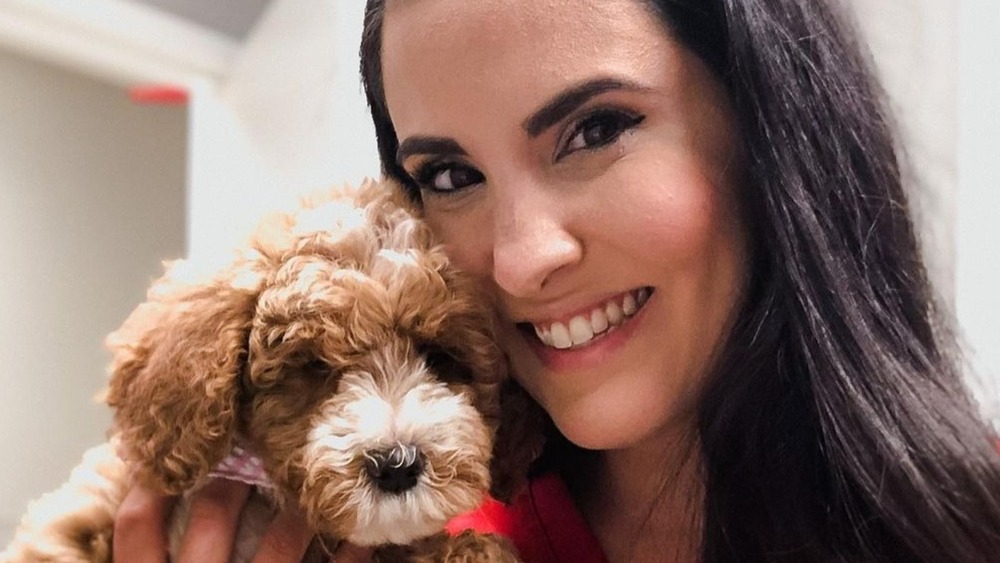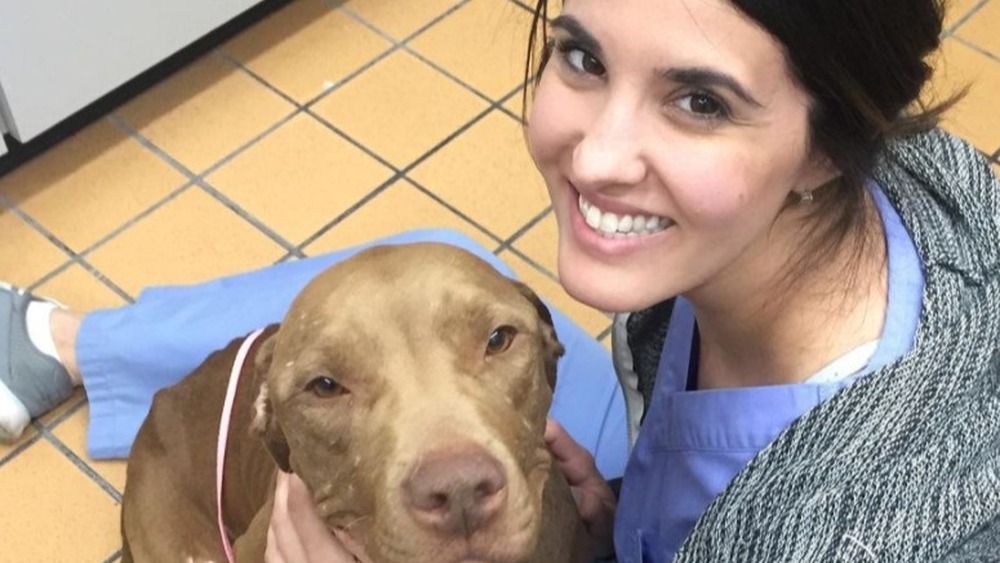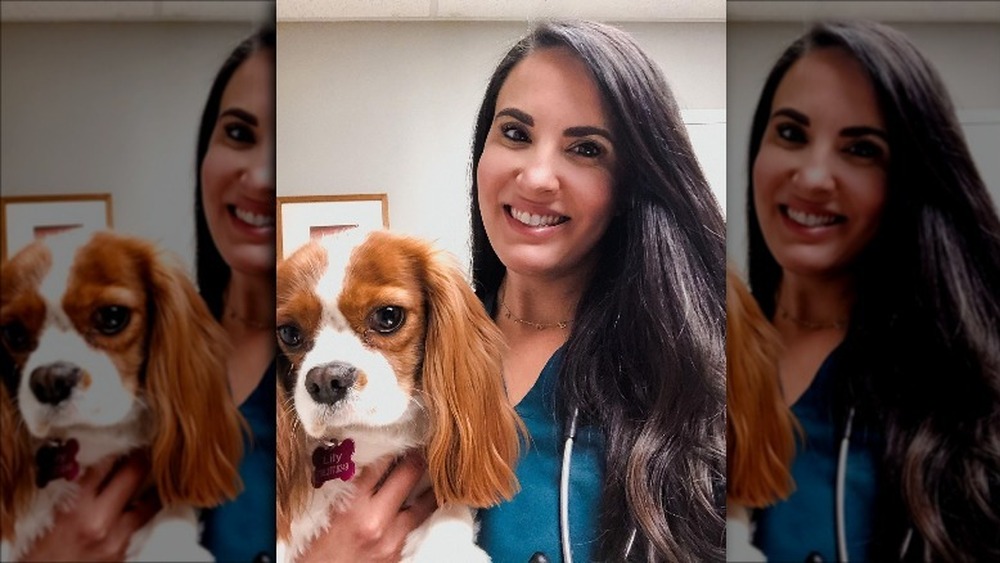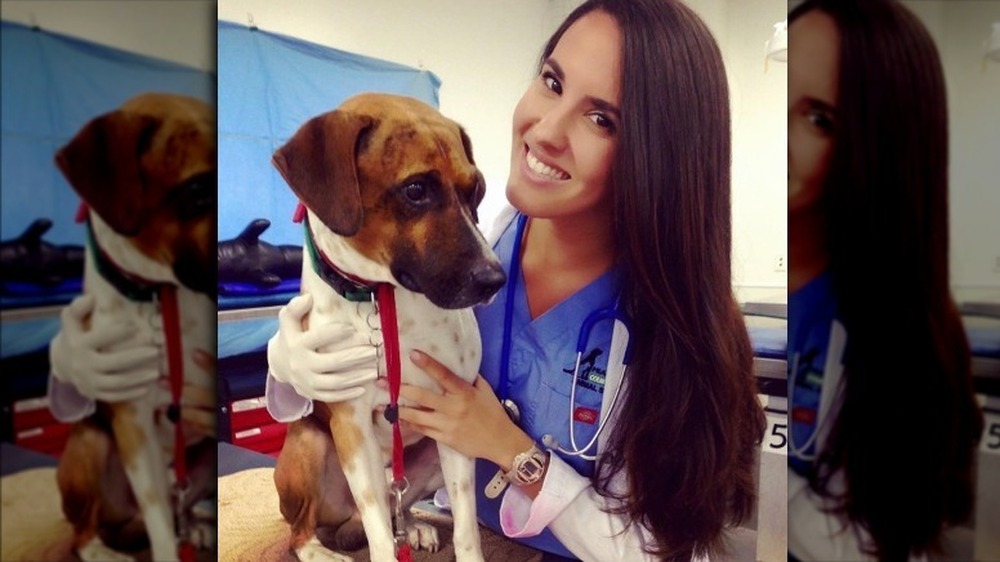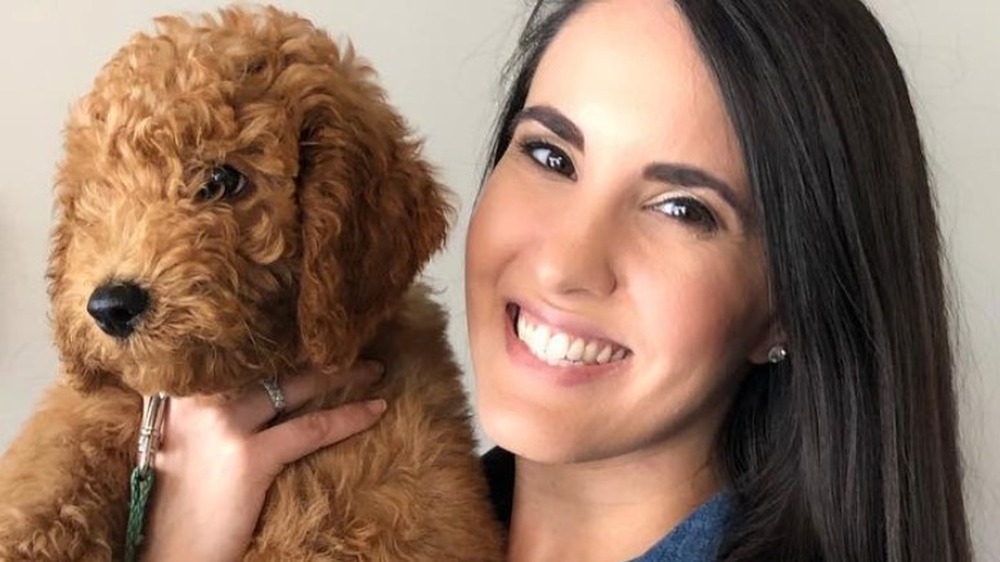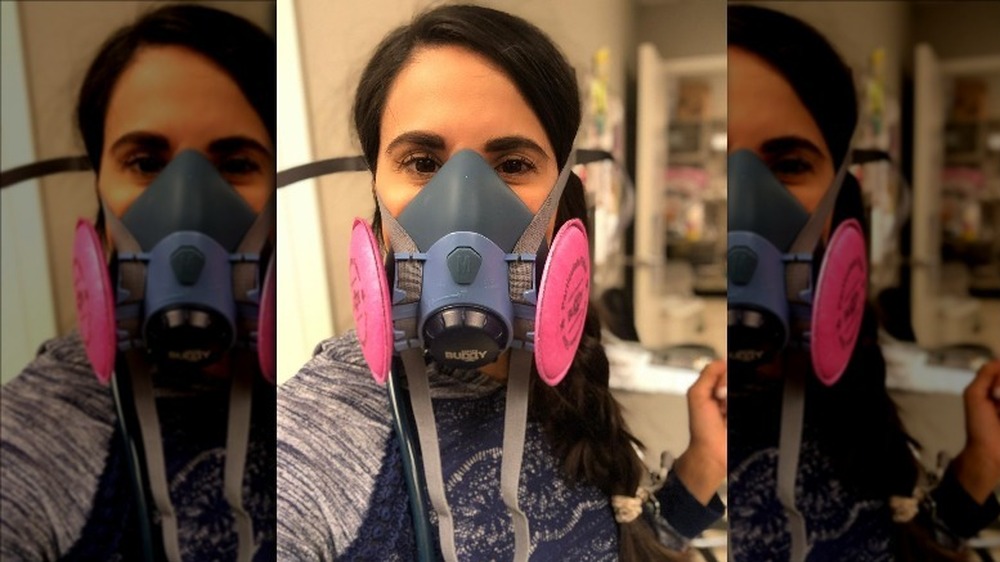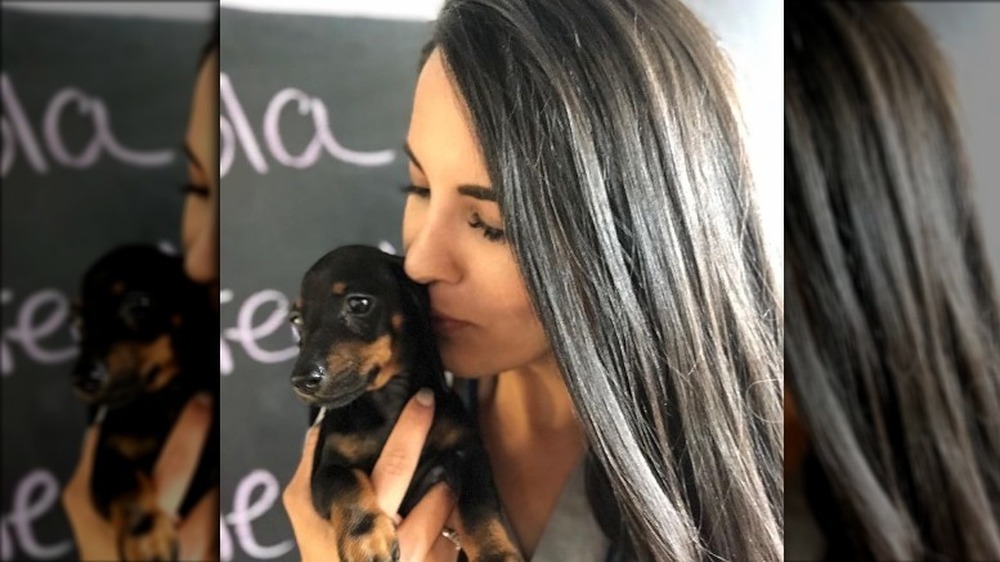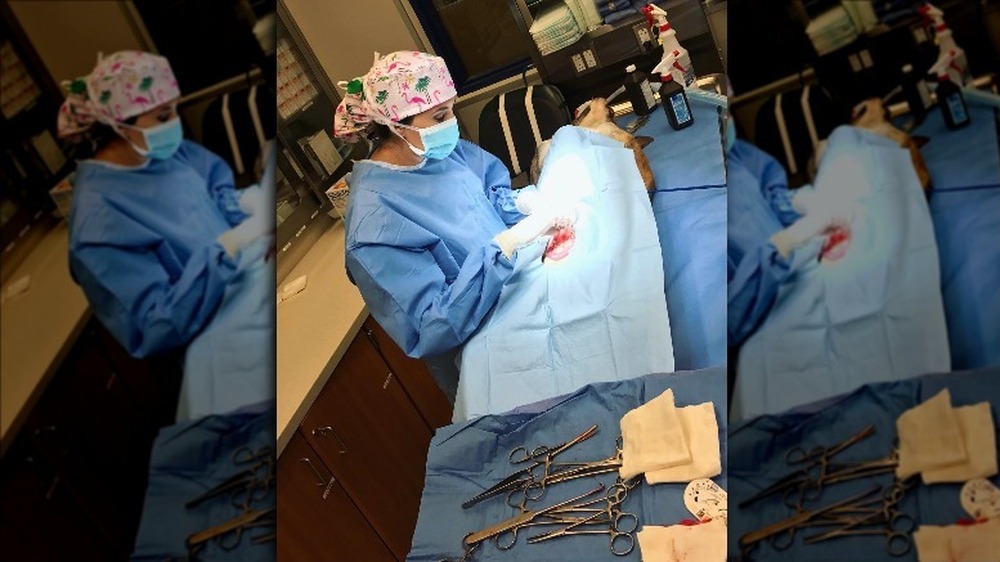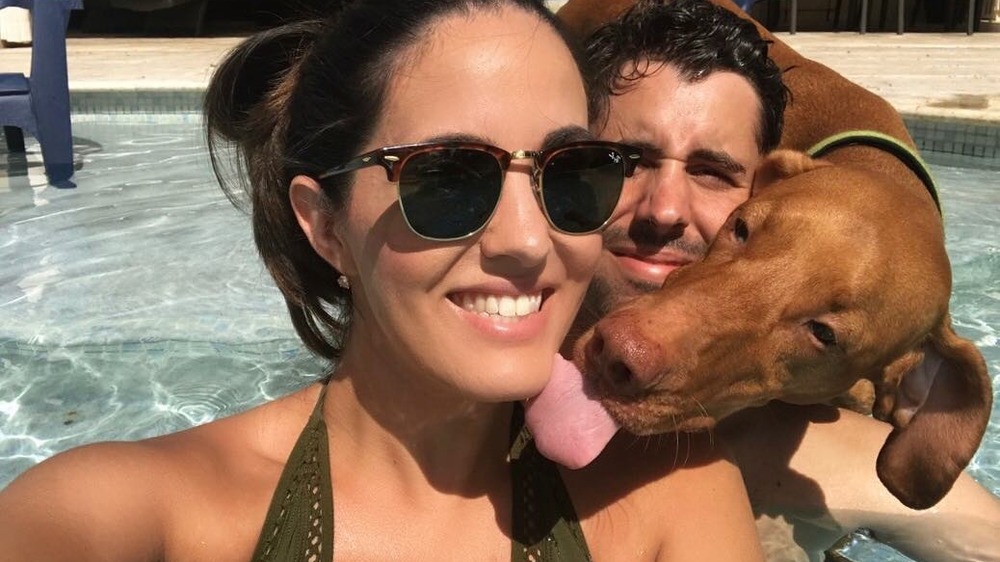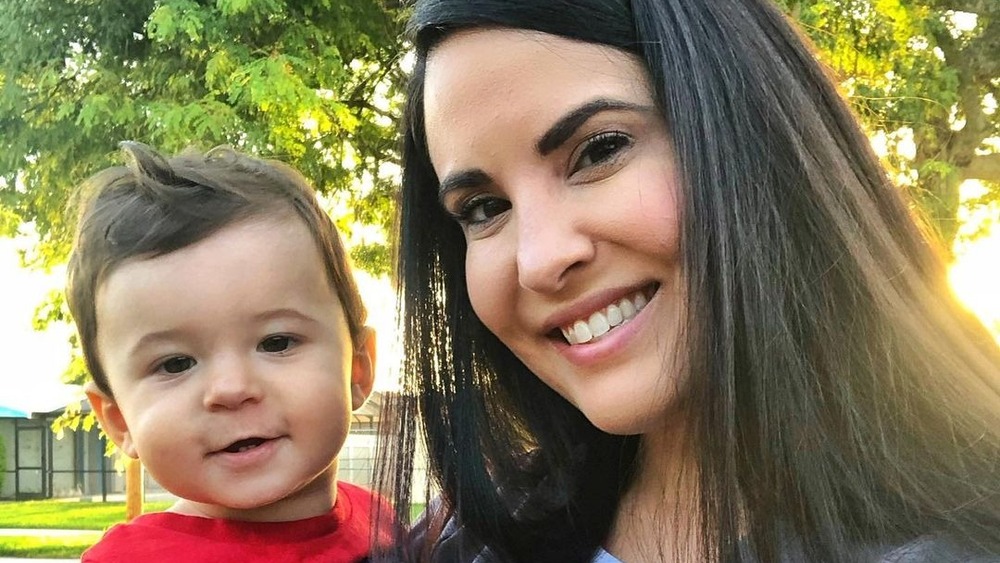Dr. Jackie Dueñas Dishes On The Gross-Out Factor Behind Pop My Pet - Exclusive Interview
Every time you wake up with a pimple bulging out of your pores, all white-headed and crested, you probably hear the voice of your mother, or dermatologist, inside your head, "Don't touch it! You'll scar your beautiful face!" But what do you do? Run to the bathroom. Squeeze. Splat. The pustule bursts all over the mirror and it's probably the best moment of your entire day.
This mysterious phenomenon — the combination of the sick and the gratifying — was the inspiration behind the hit show Dr. Pimple Popper, and an entire genre of even more graphic Youtube videos. Well, now the streaming service Discovery+ has upped the ante, with Pop My Pet. And it's exactly what you think. Dogs and cats, covered in hair as they are, don't exactly get visible breakouts, but they do suffer from all manner of lumps and cysts. These nasty nodules can actually be very dangerous, even life-threatening, and you often need an expert to step in and save your beloved little fluffy.
That's where Miami-based veterinarian, Dr. Jackie Dueñas, has found her niche. The recent vet school grad, wife, and young mom to an adorable baby boy, sat down with Nicki Swift to talk about her new reality show, Pop My Pet, which she stars in alongside fellow vets Dr. Cody Creelman and Dr. Grant Dunbar. She told us how she balances TV stardom and motherhood, and of course, reveals the smelly truth behind all those bulbous, moldering corpuscles that have taken her skill to the absolute limits.
How Dr. Jackie Dueñas went from vet to reality star
How did you go from recent vet school grad to TV star? How did Discovery+, discover you?
Well, I think it's flattering to say TV star. I don't know that I'm there yet, but it's very surreal. I think that these last few years have just gone by so quickly, and I never would have imagined that I would be on TV like the vets that I kind of grew up watching.
I'm very fortunate to work in a really wonderful practice. My boss is really wonderful about providing us with opportunities; she's an avid and prolific writer, just in the veterinary world as well and just through communications and contact, we ended up getting in touch with Renegade 83 and did an interview. And I, out of the dozens of people that were interviewed — I was honestly very surprised — but felt very honored to have been chosen to be one of the vets on the show.
When you were going through vet school, did you ever imagine that it would turn into a TV career?
Oh God, no. And it's funny because I started vet school wanting to do something completely different than what I'm doing now. I came from a shelter medicine background, so working at local animal shelters and refuge centers. So I was very full-force that when I graduated, I was going to be doing shelter med, and then I went to vet school, but I stayed very open to different opportunities and I realized I really love general practice. I love the relationships that I get to build with my clients, and we very much become a family and a team, and I liked having the ability to be able to provide consistent care and see that pet from [the] start, from when they're very puppies to when they're adults.
How Dr. Jackie Dueñas handles the gross cysts on Pop My Pet
So getting to the show a little bit, I tried to watch the screener during breakfast.
You can't watch it with food, that was mistake number one.
It was a mistake. Just, even with the intro, it's just basically like a super cut of cysts popping. So I had to circle back to it initially, but I got through it. Do you have any ick factor with any elements of your job or are you just over it? It's just nothing to you anymore?
It's funny because I think it takes a lot for us to get grossed out. I think we all, individually, have our own different bugaboos; for me, eyes, eyeballs freak me out. If an animal comes in with an eye that's just pop toes hanging out that for me. I'm like, I can do it, but have to stomach my way through it, but it's not uncommon for us. I was just doing a cat spay earlier and my stomach was grumbling and I'm like, while, I'm inside removing a uterus, I'm kind of really hungry, I wonder what we're going to order for lunch. It's one of these things that you just kind of like...
So this show is kind of like Dr. Pimple Popper, but for animals. But some of these masses are actually not just pimples. They're dangerous, right?
Yeah. They're tumors. Yeah absolutely.
There's obviously there's something oddly satisfying about popping a pimple or even watching it happen, or these shows wouldn't exist. There are YouTube channels dedicated to this kind of thing. We've all done it. Right? There's something gratifying about it. Do you have any medical insight as to what is going on here?
I, again, there's a lot of — It's the ick factor. It's like those, 'I want to look at it, but I have to turn away and I think people like the satisfaction of seeing things pop and squeeze. Not everyone can handle it, but I am definitely one of those that— give me a slow-motion, pimple popper video, and I'm a big fan."
It's like exorcising a demon, get it out!
I haven't had it put in that way, but that's a good way of looking at it. We're exorcising puss, I guess. Yeah. It's just, it's crazy to think that, our bodies are so amazing, but they also create such nasty things.
Did you have pimples growing up? Did that affect your path at all?
I mean, we all deal with teenage acne, but no, I was very fortunate that I didn't have all this cystic acne. Just the normal teen stuff.
Dr. Jackie Dueñas explains why that lump can kill your pet
We've all seen a pet, maybe a dog, with one of these masses on their back, or elsewhere. How do you know when a bump like that becomes dangerous?
So it's not always necessarily size-related because there are masses that are very small that can be dangerous. It's all depending on the tumor origin. So usually anytime I say, if you have a dog that has a lump or a cat that has a lump anywhere absolutely go and see your veterinarian immediately. Sometimes we do things like benign neglect where we say, "Hey, you know what? We're not really worried about it. Let's keep an eye on it for XYZ months. If it gets bigger, then we go from there," but I always, without a doubt, always poke them. And I look at them under the microscope because I like to say, "Hey are there cells that could potentially be concerning?" And then at that point, if there is, then we always remove it and send it off for biopsy. But I've had very aggressive cancer cells that are really big.
And actually the mass that we removed on Pumpkin on the Discovery+ show Pop My Pet was actually a benign mass. So in theory that mass was not harming it in that it wasn't going to metastasize anywhere. It wasn't going to cause systemic disease, but now you have a dog that has really suppressed and almost like zero quality of life because of something so large.
Hardly benign when you have a growth on your pet that is taking over their body right?
Exactly.
Yeah. Benign is a cancer word. That's what you mean. Right?
Yeah. Usually, when we look at lumps and bumps, we classify them as far as tumors go, because we can have abscesses, we can have cysts, those are all fluid-filled things. But when we're talking about solid masses, we talk about something being benign or malignant; benign, meaning it doesn't have the opportunity to metastasize or spread to other organs versus a malignant mass is something that is going to spread. They're both cancers for all intents and purposes, but how we think of cancer would be a malignant mass.
The one thing that almost made Dr. Jackie Dueñas puke
So one thing I noticed is some of these cysts can really stink. Have you ever thrown up?
I have not thrown up, but I was gagging when I was pregnant with my son. I had a cat that came in with an anal gland abscess, and it had literally abscessed and the anal glands are located near the rectum — I feel like, here we are talking about rectums and it's the middle of the day — but it had an anal gland abscess and this was a very sick cat who'd had this abscess for quite some time. How we treat it is we lance it. So we actually cut through it, everything comes out and it was just like five days of putrid, anal gland material, and abscess material. It was one of those where I kept having to like, "Okay, I need to step out, take a breather." And, I was definitely retching, but no vomiting, fortunately.
Do you have to put that stuff under your nose like in an autopsy?
No, but that actually wouldn't be a bad idea.
Okay. Well, we're always here for ideas. Now, one of your clients on the show Pop My Pet actually likes the smell of pus. What was that about!? Get out of here with that!
I think that's her strange proclivity. I don't know that I share the same enthusiasm that I have to smell things. I do like to touch things after we remove them, with my gloves. I don't know that I'm as excited to smell things. Unfortunately, the mass that we removed off that gator wasn't really smelly. So I think she might've been disappointed.
What was the most deadly animal Dr. Jackie Dueñas treated?
In the episode we saw, there was a huge alligator with a big lump. You also got hit in the face with alligator pus. What's the safety protocol after that?
So definitely, fortunately, I didn't get anything in my eye, but definitely washing down, decontaminating but when we do these surgeries, there are all these little superficial skin vessels. So anytime you make a cut, if you hit something that pulses, a lot of them kind of shoot all over the place and I think that's one of the fun things with abscesses or ear hematomas is like, you always, we all stand around and every time we cut, there's always a trajectory of where you think it goes like the typical splash zone and it always goes somewhere it's not meant to.
So that huge gator was named Predator — for good reason. It had a split lower jaw like the aliens from that movie. Is there any animal too dangerous for you to take on?
Predator was definitely outside of my comfort zone. When we go to vet school, we learn to treat all animals and when we graduate, we can treat anyone really, but I definitely feel more comfortable in the small animal world with dogs and cats. But I was like, I find Gators to be, pretty cool animals. They literally have barely evolved since the dawn of time and I think that's a true testament to how strong they are as a species. So I was definitely up for it. I'm game for anything. Honestly. I prefer things on land rather than in the water. I'm not aquatically inclined.
Is that the most exotic animal you've ever lanced?
When I was at UF [vet school] we had a tiger that came in, which was really cool. I've done vultures. That's pretty much what I've done. Yeah.
Dr. Jackie Dueñas tells the sad story of the patient she lost
You can't control it. You can only hope to contain it, right? So these cysts can actually kill animals. We learned from the show, even if it's benign, so have you ever lost a patient?
I have. And that's actually maybe one of the things that we might see coming up next. So one of my first patients, Bailey, was a 14-year-old Weimaraner who came in kind of just at the cusp of the end of her life. Her owners were really concerned about the quality of life. We did extensive workup and everything was pointing to an overall healthy pet, but when you're talking about doing surgery on a 14-year-old, even versus like an eight-year-old ... that's a big difference. A 14-year-old is like a 90 to a hundred-year-old person. So absolutely anesthesia is very different. Losing a patient never gets easier.
We always are very good about explaining the risks and explaining what goes on, but with Bailey's family, they were very like; this is kind of a do-or-die type of thing. If we don't do this, she's going to have zero quality of life so we're okay with going to surgery and seeing where we get. But it was definitely really disappointing. It was something that was very hard on me.
Veterinarians will always say if you haven't lost a patient, you haven't been doing this long enough. And I think that honestly, it kind of diminishes the impact of what it is to feel loss of a patient. It's hard. It's hard to be able to give that peace to the family. It's hard on yourself. And I feel like those are the ones that stick with you. And I don't think that necessarily our clients see that side of us. So I'm nervous about that episode to come out — if it comes out — but I just hope that people understand that their veterinarians are real, that we grieve loss, just like how they do.
Dr. Jackie Dueñas explains the trickiest part about cyst surgeries
Some of these masses are so big. It reminds us of when cosmetic surgeons have to do skin removal after a patient has extreme weight loss. Is that part difficult when there was a huge mass and now there's just a big hole in someone's pet you have to deal with?
So I feel like, believe it or not, in the last two masses that I've removed, it's been definitely the most time-consuming part. Removing the mass is actually much easier than what I thought it would be and then just aligning the skin.
You're kind of just left with like this big tent of flapping skin and it's not normal skin; it's stretched to its max. And then comes the added challenge, of unlike human plastic surgery, where things are meant to look very perfectly. I still feel this obligation to try and give my patient the most normal look, although fortunately dogs and animals are not judgey — they're very accepting. So trimming back the tissue to get things to evenly align is important, because you're right. You don't want a big hole there. It can actually lead to postoperative complications, infections, and things of that nature.
What Dr. Jackie Dueñas' husband thinks of her new show
You're also married and a new mom. How does your husband stomach your work stories? Does he want to hear about the lump of the day?
Ha, you know what? He is very supportive. We've been together since before I went to veterinary school — we actually met and then I left for veterinary school. So I think if he can go through a long-distance relationship and four years of veterinary school, he's end game for sure and he's wonderful. He does not have the same stomach that I do. He's an accountant. So he deals more with numbers kind of guy. And he was sitting next to me at the premiere. It was actually my birthday on the day that the show premiered on Discovery+. We had my small intimate family there and he was holding my hand, but he just kind of doing one of these, "I'm so proud of you but I can't look."
So he liked it, but had to look away, but he was into it? That sounds like a sane reaction.
He's very supportive of me and my family for that matter. I had my almost 90-year-old grandmother there too and she told me, "I love you, I support you, I'm very proud of you, but I cannot watch this either." I have videos of her kind of just sitting there on the couch and just kind of going up and down like that.
How Dr. Jackie Dueñas' balances being a mom, vet, and TV star
You also have a new baby boy. He looks a little young to enjoy the show. At what age do you think he'll be able to watch his mom on TV?
Oh, he's seen his mom on TV. He saw me on TV and he said, "Mama," in his cute little voice. My parents had it on for him while I was at work and they said they had to turn it off because he was just getting so excited that it was me, but he didn't understand that I wasn't there. But he's seen it. I debate on whether you should let a 15-month-old watch a surgery show. I don't know that he necessarily knows what was happening, but he definitely was very excited to see his mom on the screen.
Obviously you're a full-time vet, a new mom, now you have a TV show — and now you're wasting vet time talking to reporters!
Yeah, this is fun!
It's a lot though right?
You know, it's funny. I never realized how hard of a job being a mom was until I became a mom. And I think being a mom and being a veterinarian are both very demanding roles. Very different, but I love what I do. But I make sure that when I'm with my son, I really truly step away and that's my family time. And I just try and prioritize, this is my work time, this is my family time, but it definitely has been a challenge. And that's one of the things I talk about on my Instagram, especially for other vet moms to know, there is a community of just moms in general, working moms, stay at home moms because that's very much a job as well. There is a community and that merging my life as a veterinarian, my responsibilities, and my obligations versus what my family's expectations are.
It's hard. It is. And I don't want to say that I've found the perfect balance. It comes and goes and I constantly have to put myself in check. I've found for me, especially now with the show, with my son, getting a little bit older, instead of working four or five days a week, I work three and a half days a week. And that's what's great about the veterinary field. It's very fluid. So, I can at any point say, "Hey, you know what? I want to come back to work full time," or "You know what, I don't want to do GP anymore. I only want to work on exotic." So I think that's one of the really great things about our field. So right now this is what works for me and how I find balance.
As of March 1, 2021, Pop My Pet is streaming exclusively on Discovery+.

